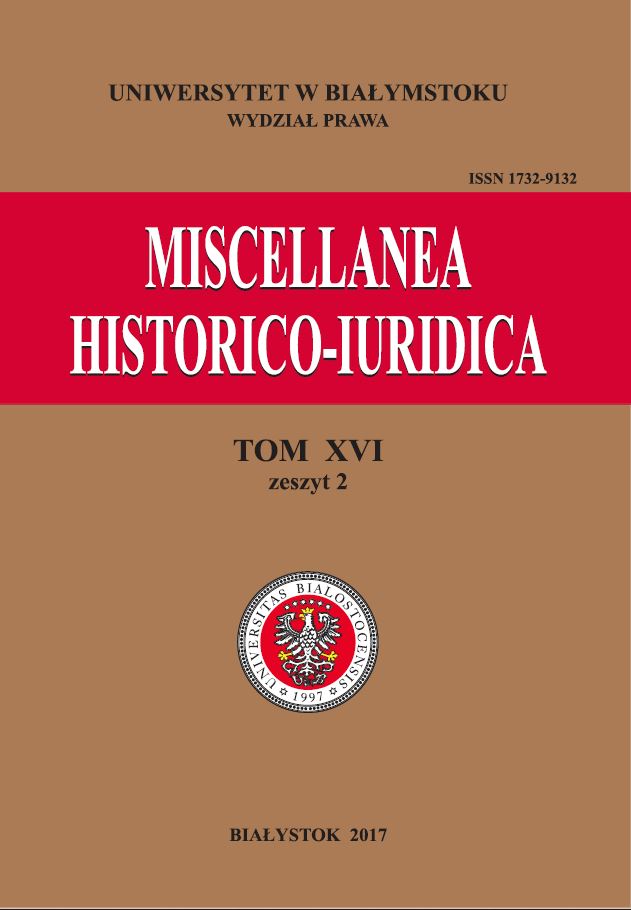L’enseignement juridique en Hongrie à l'époque du royaume (regnum Hungariae)
Słowa kluczowe:
Królestwo Węgier, nauczanie prawa, prawo krajowe, prawo rzymskieAbstrakt
The author presents Genesis, the ways and aims of legal education in Hungarian universities, with a special focus on the Faculty of Law in Trnava, which was established in January 1667 (now Eötvös Loránd University in Budapest). The tradition of legal education has common European roots and is connected with the medieval foundation of universities in Bologna, where the priority was given to Roman law education. Due to the process of specialization and new tendencies in teaching in West European universities, the Hungarian universities were also modernized and enlarged. The exceptional position in education was dedicated to Roman and canonical law, but in the Kingdom of Hungary domestic national law was also taught – a practice that has existed at the Faculty of Law in Trnava from its very beginnings.
Bibliografia
B`onis Gy., Einflüsse des römischen Rechts in Ungarn, IRMAE Pars V, 10, Mediolani 1964.
Csizmadia A., A magyarországi felsőoktatás kezdetei (Les débuts de l’enseignement supérieur en Hongrie), [in:] Jogi emlékek és hagyományok, Budapest 1981.
Csizmadia A., A pécsi egyetem a kőzépkorban (L’Université de Pécs au Moyen Age), Studia Iuridica Auctoritate Universitatis Pécs Publicata 40., Budapest 1965.
Dlicher H., Der Typenzwang im mittelalterlichen Vertragsrecht, "Zeitschrift der Savigny-Stiftung für Rechtsgeschichte: Romanistische Abteilung" 1960, 77.
Hamza G., Entstehung und Entwicklung der modernen Privatrechtsordnungen und die römischrechtliche Tradition, Budapest 2009.
Hamza G., Le développement du droit privé européen. Le rˆole de la tradition romaniste dans la formation du droit privé moderne, Budapest 2005.
Hamza G., Origine e sviluppo degli ordinamenti giusprivatistici moderni in base allatradizione del diritto romano, Santiago de Compostela 2013.
Hedemann J.W., Die Kölner Juristenfakult ̈at, [in:], Festgabe der Deutschen Juristen-Zeitung zum 34. Deutschen Juristentag in Köln, Berlin 1926.
Hübner H., Die Einwirkung des Staates auf den Rechtsunterricht, [in:] Festchriftfür W. Felgentraeger, Göttingen 1969.
Kantorowitz E., Kaiser Friedrich der Zweite, Berlin 1927.
Klaniczay T., Egyetemés politika a magyar kőzépkorban (Université et politiqueau Moyen Age hongrois), [in:] Eszmetőrténeti tanulmányok a magyar kőzépkorból, Budapest 1984.
Konek S., Antal Gy., Egyházjog (Droit canonique), Budapest 1903, 9e éd.
Mályusz E., Kőzépkori egyházi értelmiségúnk társadalmi. Alapjai (A budai egyetem tőrténetéhez) [Les bases sociales de notre intelligentsia ecclesiastique médiévale (Contributions` à l'histoire de l’Université de Buda)], [in:] Eszmetőrténeti tanulmányok a magyar kőzépkorból, Budapest 1984.
Peter H., Die juristische Fakultät und ihre Lehrfächer in historischer Sicht, Juristische Schulung 1966.
Savigny F. C. von, Geschichte des römischen Rechts im Mittelalter, t. 1, Berlin 1833, 2e éd.
Tonk S., Erdélyiek egyetemjárása a kőzépkorban (Des Transylvains aux universitésau Moyen Age), Bukarest 1979.
Veress E., Olasz egyetemekre járt magyarországi tanulók anyakőnyveés iratai 1222–1864 (Le registre de l’Etat-civil et les documents des ́el`eves de Hongrie ayantpoursuivi desétudes aux universit ́es italiennes 1222–1864), Budapest 1941.
Viehweg Th., Zur geplanten Reform des Rechtstudiums in Deutschland, [in:] Politische Ordnung und menschliche Existenz. Festgabe für E. Voegelin, München 1962.
Wieacker F., Privatrechtsgeschichte der Neuzeit, Göttingen 1967, 2e éd.







